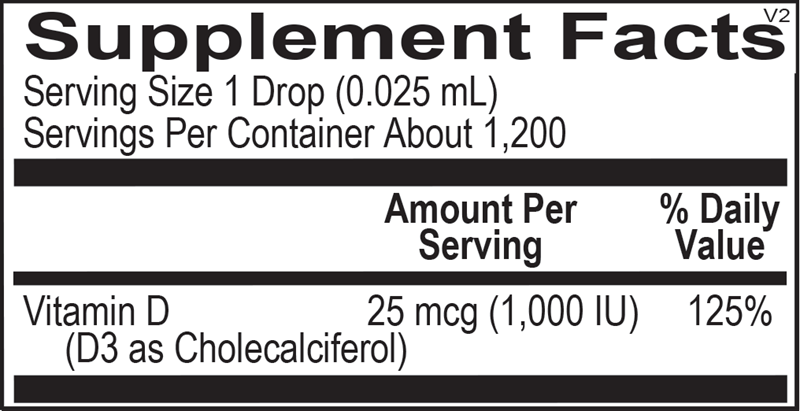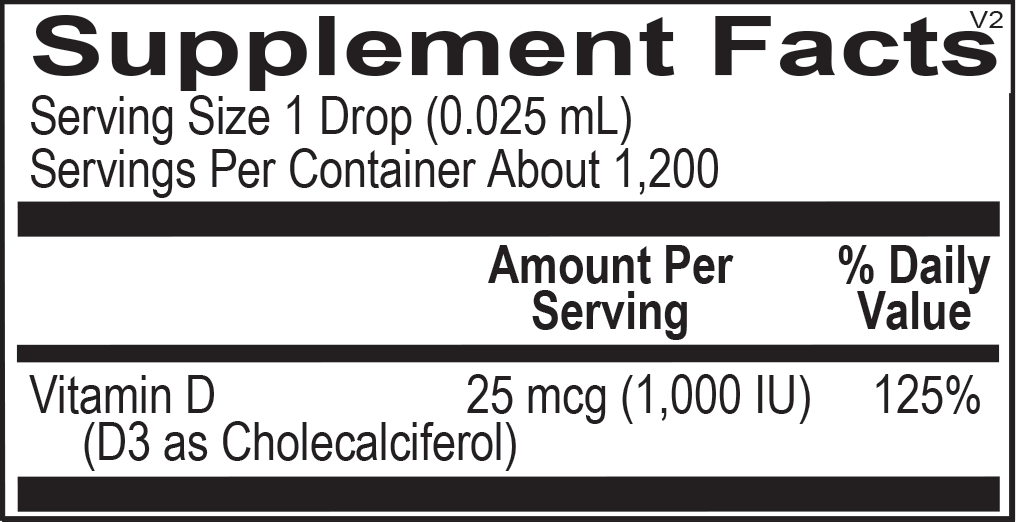Shop Now /
Liquid Vitamin D3
Sku: 871001


In addition to supporting bone health, vitamin D plays an important role maintaining cardiovascular health and immune function, and promoting an overall sense of well-being.
Categories:
Essential Vitamins, Musculoskeletal Health, Essential Health
Clinical Applications
- Maintains Bone and Dental Health
- Increases Calcium Absorption and Balance
- Boosts Immune Activity
- Supports Cardiometabolic Health, Blood Sugar Balance Already Within Normal Levels, and Weight Loss
- Helps Increase Musculoskeletal Strength and Comfort
Vitamin D is a steroid vitamin, a group of fat-soluble pro-hormones that are best known for the role they play in supporting bone health and aiding in the absorption of calcium and phosphate from the gastrointestinal tract. However, a growing body of research highlights the important role of vitamin D in supporting cardiovascular health and blood sugar balance already within normal levels.
Liquid Vitamin D3 is delivered in the preferred cholecalciferol form for optimal use by the body and provides 1,000 IU per drop for easy administration and absorption, ideal for those who prefer an alternative to capsules.
Suggested Use:
1 drop (0.025 mL) per day or as recommended by your health care provider. Can be taken directly on the tongue and swallowed or mixed with the beverage of your choice.
Vitamin D Depletion
While it has long been assumed that the majority of the population achieves adequate levels of vitamin D through exposure to the sun, the biosynthesis of the nutrient is affected by time of day, seasons, location, smog/pollution, clothing, and sunscreen.
Bone and Dental Health
Numerous studies have highlighted the importance of vitamin D to maintaining healthy bone density.
Cardiovascular Health and Blood Sugar Balance
In light of the role that vitamin D plays in a variety of tissues and body systems, recent research has focused on its contribution to cardiometabolic wellness. Vitamin D has also been shown to support healthy blood sugar metabolism.
Immune Health and Modulation
One of the more profound functions of vitamin D is its ability to modulate immunity. An important study suggested that improving vitamin D status significantly affects the expression of genetic pathways linked to immune activity. Vitamin D has been shown to boost the immune response by up-regulating specific genes that increase cellular production of natural compounds that protect us against pathogens.
Musculoskeletal Comfort
Numerous studies also point to the key role of vitamin D in supporting musculoskeletal strength and comfort. In one study, among adult patients with nonspecific musculoskeletal discomfort, over 95% had vitamin D deficiency and responded to replenishment of vitamin D. Moderate deficiency of vitamin D has also been shown to predict knee discomfort over a five-year period and hip discomfort over 2.4 years.
 |
Liquid Vitamin D3
Sku: 871001
In addition to supporting bone health, vitamin D plays an important role maintaining cardiovascular health and immune function, and promoting an overall sense of well-being.
Categories:
Essential Vitamins, Musculoskeletal Health, Essential Health
Clinical Applications
- Maintains Bone and Dental Health
- Increases Calcium Absorption and Balance
- Boosts Immune Activity
- Supports Cardiometabolic Health, Blood Sugar Balance Already Within Normal Levels, and Weight Loss
- Helps Increase Musculoskeletal Strength and Comfort



